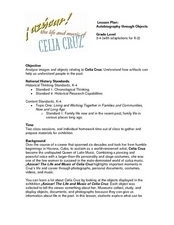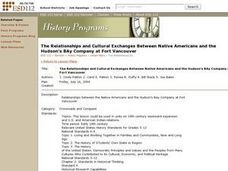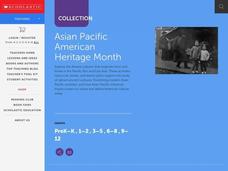American Museum of Natural History
Create Your Own Time Capsule
The corona virus pandemic is indeed a historic event. A time capsule activity permits young historians to document these days of social distancing, remote learning, and quarantine by collecting artifacts that capture what their lives are...
Curated OER
Family Life in the 1830s
Students compare and contrast family life today with family life in the 1830s. They conduct research on Old Sturbridge Village, read primary source documents, and develop a list of generalizations comparing/contrasting families of the...
Federal Reserve Bank
The Output Gap: A‘Potentially’ Unreliable Measure of Economic Health?
How can we accurately estimate what the economy should produce now and in the future? Have your pupils tackle this question as they learn about real versus potential GDP and as they review data regarding the output gap in the United States.
Curated OER
Fluency Passages, 3rd Grade
What would it be like to travel in a covered wagon? Learn about the life of a pioneer with a short informational reading passage. Kids read four paragraphs about traveling in a covered wagon and how it is different than traveling today,...
Curated OER
Morning Girl
Fifth graders read the novel "Morning Girl" by Michael Dorris. Using the text, they compare and contrast the two cultures, Arawak and Taino in the novel and research the landing of Columbus in San Salvador. They create a family tree...
Smithsonian Institution
Autobiography through Objects
Show youngsters how objects can tell a story! Here your class will learn about Cuban salsa dancer Celia Cruz by analyzing pictures of her dress, her shoes, and her marriage certificate. After describing Cruz's items and imagining what...
Curated OER
Becoming Part of the Action
Students improve visualization skills through role play, texture identification, and storytelling. They discuss connections between a painting and their own lives.
Curated OER
Podcasting and the News
Students participate in a class discussion about pod casting. They access a podcast and practice using such features as pause, rewind, and fast-forward. They listen to a news podcast and complete a graphic organizer about what they have...
Curated OER
Carnival Celebrations: Masks and Vejigantes
Students explore Carnival. For this Puerto Rico Carnival lesson, students discover the history of the cultural celebration as well as the significance of the elaborate masks worn for the festivities. Students create their own Carnival...
Curated OER
Artifacts 1: What Can We Learn From Artifacts?
Sixth graders are introduced to artifacts and explore an online archaeological site to connect clues about how people once lived. In this deductive reasoning instructional activity, 6th graders participate in the stratigraphy game on...
Curated OER
A Day at Mount Vernon
Students discover daily life on George Washington's plantation, Mount Vernon. In this compare and contrast instructional activity, students examine the life styles at four distinct sites at Mount Vernon to become familiar with the...
Curated OER
Trip to Mount Vernon
Students compare and contrast travel in the 18th century with current methods of travel by participating in a simulated trip to Mount Vernon. In this US history lesson, students write a letter to George Washington for permission to visit...
Curated OER
POWWOW
Students investigate the significance of the Powwow to the Native Americans. They write a story about a special tradition or custom from their own family, play Native American children's games, prepare Indian fry bread, and participate...
Curated OER
The Relationships and Cultural Exchanges Between Native Americans and the Hudson's Bay Company at Fort Vancouver
Students are introduced to the geography of the Columbia River basin and its history. Using the internet, they research the relationships between the Native Americans and the Hudson Bay Company. They also discuss the effects on the...
Curated OER
Japanese American Baseball in the Camps
Learners study Japanese American internment camps. In this American history lesson plan, students compare and contrast the camp internees' experiences with with team sports-related challenges learners have encountered. Students discuss...
Curated OER
Animal Signs
Students discuss the many different types of animal signs that can be used to identify and track animals. They participate in an hands-on activity in which they examine tracks, trails, homes, territory markings, and even "scat" left by...
Curated OER
What Can We Learn from Artifacts?
Young scholars examine how artifacts are discovered and explore their significance as it pertains to gathering important information. In this artifacts activity, students obtain knowledge about the way artifacts are excavated and examine...
Curated OER
Activity Name: A Step Back In Time
First graders step back in history. In this history lesson, 1st graders compare life in the past with life today as they create books that compare clothing, homes, schools, chores, and technology of today to those of the past.
Curated OER
Time Travel
Fourth graders become familiar with the early explorers of our state. In addition, they conceptualize life during the 1800's in relation to their own personal histories and knowledge of 19th century events.
Curated OER
Happy Birthday Whitehouse
First graders explore the White House and its history through celebrating its birthday. Basic facts are examined and personal experiences related to the exploration of this structure.
Curated OER
Artifacts 1: What Can We Learn From Artifacts?
students will learn about artifacts-what they are, how they are initially buried and then excavated. They participate in an online game and called "Stratigraphy" and participate in the "If Trash Could Talk" activity page.






















